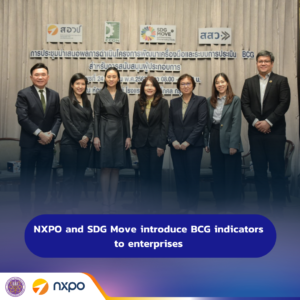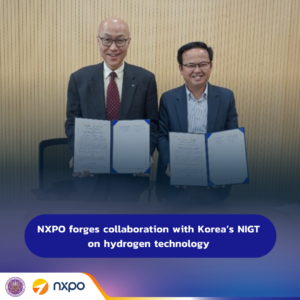The International Union of Food Science and Technology (IUFoST), in partnership with NXPO, the Food Science and Technology Association of Thailand (FoSTAT), Thailand Science Research and Innovation (TSRI) and the Program Management Unit for Competitiveness (PMUC), organized Resilient and Innovative Food Systems Conference on 13 November 2023 at Queen Sirikit National Convention Center in Bangkok. The conference aimed to address the vulnerabilities of the global food production systems to numerous challenges, including conflicts, pandemics, economic volatility, and the impacts of climate change. Understanding these factors is crucial for establishing sustainable food production systems capable of meeting the increasing demands resulting from the world’s expanding population.
NXPO President Dr. Kitipong Promwong reported that NXPO is currently developing a strategy for the food sector, with a particular focus on future food, aiming to introduce a new growth engine to the Thai economy. The strategy emphasizes wellbeing, sustainability and innovation.

“The current export value of Thailand’s future food stands at THB 140 billion. NXPO, in collaboration with the Thai Future Food Trade Association and the Thai Food Processors Association, is working to foster a dynamic innovation ecosystem to strengthen the Thai food industry. The initiative aims not only to increase national competitiveness, but also to ensure the resilience and sustainability of global food production systems. This effort also involves promoting Thai cuisine and street food on the world stage, contributing to Thailand’s tourism campaign,” Dr. Kitipong explained. He expressed confidence that Thailand is poised to achieve THB 350 billion in future food exports by 2027.
Ms. Sirinya Lim, Senior Director of Innovation Economic Policy Department at NXPO discussed various challenges faced by the Thai future food industry. As the world’s leading food exporter, Thailand must implement policies to transition its food industry towards future food production. NXPO’s roles include developing a transformation strategy by leveraging capabilities in higher education, science, research and innovation.

“Thailand is a major food producer. Our challenge lies in the development of novel foods such as insect proteins, seaweed and duckweed and turning them into future foods for export. Fortunately, both the government’s BCG policy and the National Food Board prioritize future food development. NXPO is actively working on measures to promote research and innovation to enhance the production process and quality to boost future food exports. Our goal is to achieve THB 350 billion in future food exports by 2027,” Ms. Sirinya remarked.
The conference brought together participants from various countries to share their experiences and engage in debates on sustainable agriculture as advocated by the UN Summit. Recognizing that food production activities contribute to greenhouse gas emissions, it is important to establish low-carbon food production systems by employing advanced technologies in farming, processing, and logistics. This approach will support the goal to reach zero emissions by 2040 for developed countries and by 2050 for emerging economies.








